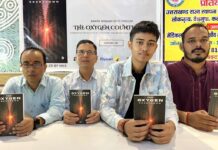Interview with Kasturi Sinha
Your literary journey began in a small room surrounded by books. What sparked your passion for writing, and how has your environment influenced your work?
KASTURI SINHA: My literary journey began in a small, quiet room filled with books, their spines stacked against one another like silent companions. The smell of paper, the weight of each page, and the worlds waiting within sparked an insatiable curiosity in me. This early exposure planted the first seeds of my passion for writing, nurturing an urge to create stories that could transport others as these books had transported me. My environment has always been more than a backdrop; it’s shaped my imagination and taught me the power of a well-crafted narrative and also maybe being the daughter of professor parents, I had a wider opportunity to hang in and out with books. Each story I write or each poem I create marks the emotion that has been given a fuel in this room. I basically started writing at the age of 16 when my writings were immature but gradually I developed the skill to reach to this position where I can act as a mentor and guide to our upcoming author and poets.
With over 5,000 poems penned, you’ve made an indelible mark on Indian literature. What drives your creativity, and how do you stay inspired?
KASTURI SINHA: Creating poetry has been my way of connecting deeply with the world, capturing moments, emotions, and insights that often go unnoticed. Inspiration flows from my surroundings—people, nature, history, and the shared experiences that make us human. I see poetry as a way to preserve fleeting thoughts and make sense of life’s mysteries. Staying inspired comes from a blend of curiosity, introspection, and a commitment to the craft; I strive to view every experience as an opportunity for exploration. Ultimately, it’s the joy of expression and the desire to resonate with others that keeps my creativity alive.
As a renowned poet and scholar, what advice would you give to aspiring writers seeking to make a name for themselves in the literary world?
KASTURI SINHA: To aspiring writers hoping to make a mark in the literary world, my advice is to cultivate a unique voice and stay unwaveringly true to it. Write with honesty, allowing your work to reflect the truths that resonate most deeply with you. Read widely across genres and eras, learning from the giants who have come before you, yet don’t shy away from pushing boundaries or breaking conventions if it feels right. Embrace the process of revision as writing is as much about refining as it is about creating. Finally, seek out community; engage with other writers, attend workshops, and welcome constructive criticism. The literary world values resilience as much as talent, so continue writing, even when the journey feels long.
You’re a multitalented creative force, excelling in dance, music, and visual art. How do these passions intersect with your writing, and do they influence your creative process?
KASTURI SINHA: Being immersed in dance, music, and visual art profoundly shapes my approach to writing, as each art form brings a unique rhythm, visual language, and emotional tone that influences how I tell stories. Dance has taught me about the importance of movement and flow, so when I write, I think about how each sentence flows into the next, creating a choreography of words. Music brings rhythm and pacing to my prose, guiding how I structure paragraphs, vary tones, and evoke emotions. Visual art sharpens my sense of imagery, helping me craft vivid scenes and symbolic motifs that add depth and texture to my writing. Altogether, these forms merge into a holistic creative process where I can blend disciplines, drawing on all my artistic instincts to make each piece as immersive and expressive as possible.
If you could have dinner with any literary figure, past or present, who would it be, and why?
KASTURI SINHA: If I could have dinner with any literary figure, it would undoubtedly be T.S. Eliot. His work, particularly The Waste Land and The Love Song of J. Alfred Prufrock, has had a profound impact on modern poetry and literature, and his intellectual rigor combined with his deep understanding of the human condition would make for an incredibly engaging conversation.
Eliot was not only a poet but also an essayist, playwright, and critic, and his perspective on art, culture, and language would be fascinating to explore. His reflections on the fragmentation of modern life, the role of tradition in innovation, and the tension between religious faith and existential doubt would provide rich discussion topics. I would be eager to hear his thoughts on how his conversion to Anglicanism influenced his later work, and how he saw the relationship between modernity and tradition, particularly in his poetic style.
Eliot’s wit, intellectual depth, and sharp critique of society make him a figure whose dinner table presence would surely be both stimulating and thought-provoking. I imagine that the conversation would be full of paradoxes, as Eliot himself was—a man who both embraced and critiqued the world he lived in. His reflections on time, memory, and the intersection of personal and collective histories would reveal a great deal about his views on both the past and future of literature.
At the table, there would no doubt be a quiet but intense energy—perhaps a touch of the aloofness for which he was known, mixed with the dry humor and self-awareness that characterized his writing. We might talk about the burden of literary legacy, the changing role of the poet in society, and the challenges of finding beauty in a disenchanted world.
Dinner with T.S. Eliot would be more than a mere meal—it would be a philosophical and literary feast, one that would leave an enduring impact on anyone lucky enough to share the table with him.
Looking back on your incredible journey, what’s one lesson you’ve learned that you’d like to share with your younger self?
KASTURI SINHA: If I could go back and share one lesson with my younger self, it would be to embrace patience and trust the process. I’d tell myself that growth often happens in the smallest, quietest moments, and that rushing only leads to unnecessary stress and missed opportunities for learning. It’s easy to feel pressured to achieve everything quickly, but real success and fulfillment come from allowing things to unfold in their own time. Life isn’t a race; it’s a journey, and every step whether forward, backward, or sideways teaches us something valuable. By letting go of the need to control every outcome, we open ourselves up to experiences and connections that truly enrich our lives.
How do you see your work impacting social justice and environmental consciousness?
KASTURI SINHA: As a poet, my work becomes a channel for amplifying voices that are often unheard, unveiling the injustices we too often turn a blind eye to. Through imagery, rhythm, and metaphor, poetry allows me to distil complex issues whether social inequalities or environmental degradation into forms that resonate emotionally and viscerally. In grappling with these themes, I hope to inspire readers to confront uncomfortable truths and reimagine their roles in fostering change. By intertwining the personal and the political, poetry has the power to spark empathy and action, reminding us of our interconnectedness with each other and the natural world.
What’s next for you? Any upcoming projects or releases?
KASTURI SINHA: Yes, I am glad to announce that two of my books will be available on the online and offline platforms soon. This project is half way done and maybe sooner you can hear good news of the publication. In the arena of poetry, scars often serve as both symbols and metaphors—reminders of pain, resilience, and the complex narratives of our lives. The Scar is a collection that explores these multifaceted themes through a rich voices, emotions, and experiences. Each poem in this collection delves into the stories behind the scars we carry, whether they are physical, emotional, or spiritual. This collection invites readers to confront their own scars, encouraging reflection on the moments that shape us. It embraces vulnerability and strength, revealing how wounds can foster growth and understanding. The poems range from the deeply personal to the universally relatable, capturing the essence of what it means to heal, to remember, and to find beauty in imperfection. The journey through these pages is one of exploration and discovery. As you read, may you find echoes of your own experiences and perhaps a sense of solace in knowing that you are not alone. The Scar is more than a collection of poems; it is a testament to the human spirit’s capacity to endure, to transform, and to embrace the narratives woven into the fabric of our lives.
Cup and Saucer is another collection of poems that seeks to capture the fragile moments, where the essence of life, love, and relationships resides. Each poem is a fragment of an experience, delicate yet profound, much like the bond between a cup and its saucer. Though they are separate entities, yet inseparable in their union—one cradling the other, offering solace and meaning in their shared existence. In these verses, you will find the delicate interplay of longing and connection, the delicate balance of hurt and healing, the quiet strength of love, and the raw vulnerability of being human. So, take a seat, let the steam rise, and allow yourself to be enveloped in the verses of Cup and Saucer, where each word is a sip and each line is a moment shared in the tender embrace of life and love.




